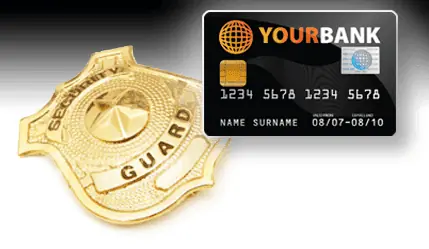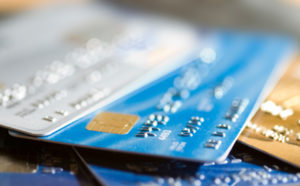It’s common practice to pay with a credit card when eating at a restaurant. Oftentimes, the signed receipt gets left at the empty table until it’s bussed for the next party. That’s enticing for a dishonest person to get your name from the receipt and begin the process of digging for gold.
Some unscrupulous servers and store clerks will carry a small device called a credit card skimmer. With a quick additional swipe of your credit card, the thief puts credit card numbers in storage and will create fake cards with which to make purchases, or sell the card numbers to other thieves. Until the monthly statement becomes available, a cardholder has no idea that fraudulent purchases were made, on the phone, over the internet, or even in person, with his or her credit card number.
These are examples of identity theft, and reasons for diligence in keeping credit cards and account numbers out of the hands of the wrong people. Identity theft happens when a person obtains someone else’s personal information without their knowledge, and fraudulently uses that information to make purchases or withdrawals from bank accounts, etc.

A Federal Trade Commission (FTC) survey in 2006 showed that more than 8 million US consumers were victimized by identity theft in the previous year. That’s nearly 4 percent of America’s adult population. In 2008, that figure rose to more than 9 million and was up to more than 11 million in 2010. Victims of fraudulent credit card purchases are usually not held responsible for more than $50 per card, so it’s the banking institutions and credit issuers that suffer the financial losses of unrecovered fraudulent debt. But that 2006 survey also revealed that victims of credit card fraud spent more than 200 million hours trying to clear their names and credit status. It’s a good idea to request a credit report, especially after experiencing identity theft. This provides theft victims the opportunity to dispute information that is fraud-related, let alone simply erroneous.
Over the internet, be wary of unsolicited email messages that request personal information for the purpose of updating a company’s member or billing information. The victim is made to believe the company is genuine when, in approaches like this, called phishing or spoofing, the company is often bogus. This is yet another way individuals scheme to obtain information for fraudulent usage.
Be sure to check monthly credit card statements. Otherwise, cardholders don’t discover their private information has been stolen until they do something like apply for a loan or a home mortgage, and are denied. It is vital to know some of the methods thieves use for obtaining peoples’ personal information. You’ll be better armed for keeping private information private. It won’t guarantee you’ll never fall victim to credit card or identity theft, but it can help to minimize risk.
A good practice is to carry only credit cards that are necessary, especially while travelling; and carry them not in a wallet or purse– a prime target for thieves – but in a front pocket. Keep other credit cards at home, in a household safe. While you’re away, arrange for your mail to be held for you at the Post Office until you pick it up. Have your newspaper delivery placed on hiatus until you return. Interior lights should be placed on timers. These small actions can minimize the appearance of an unoccupied home, and thus deter the possibility of break-in and theft of personal information while you are away.
Are there credit cards for open-but-unused accounts in your wallet? When several accounts are attached to your name and a breach of one of your accounts is discovered, there’s a very good chance that your other accounts can be violated as well. Cancel any unused credit cards and maintain only those that are used regularly.
Did you know that your trash can be a field day for thieves? They’ll look for items like cut-up debit and credit cards that are expired, credit card statements, and unused credit card checks, envelopes with return addresses which divulge your banking institutions, credit card offers, and all sorts of other items that most honest people wouldn’t know are very telling for a thief. Even something that only reveals your name gives a thief enough information to be dangerous. Rather than tearing up such documents, use a shredder. Many office product chain stores offer shredding for a small fee, based on the weight of the material to be shredded. Home shredders are relatively inexpensive and might be worth their cost several times over if you tend to receive a lot of junk mail.

If a retail clerk asks for I.D. when I use my credit card, should I be offended? Absolutely NOT! The business is attempting to curtail possible fraudulent credit card usage, and the extra measures on its part are indirectly assisting the cardholder. Ensuring the name and signature on the credit card matches that of the driver’s license, for instance, allows the business to prevent liability for merchandise that has been dishonestly obtained – STOLEN! In turn, if your credit card has come into the wrong hands, proper authorities can be alerted.
Should the internet be trusted for making purchases? It is crucial that online buyers check into the legitimacy of any company they are buying or ordering from. If it has an email address, send a message to see whether the address is valid and active. The site must be secure for credit card transactions. Check the site to see what kind of encryption software it is using. Don’t give out credit card numbers without knowing who is receiving the information.
By taking each of these steps, you are helping to ensure the protection of your identity. Being the victim of identity fraud or credit card fraud can be a very trying experience. It is best to take the initiative and avoid becoming a victim at all. And, although these steps do not fully guarantee that a person will be fully protected, they do help to reduce the risk of one’s personal information falling into the wrong hands.
Frequently Asked Questions
How can I protect my credit card information from theft or fraud?
To safeguard your credit card information, it's important to follow best practices such as regularly monitoring your account activity, never sharing your card details online or over the phone unless it's a trusted and secure source, using secure and encrypted websites for online transactions, and regularly updating your passwords and PINs associated with your credit card accounts.
What should I do if I suspect unauthorized activity on my credit card?
If you notice any suspicious transactions or suspect unauthorized activity on your credit card, immediately contact your card issuer's customer service or the number provided on the back of your card. They will guide you through the necessary steps to secure your account, dispute fraudulent charges, and potentially issue a replacement card to ensure your financial safety.
Should I sign the back of my credit card, or is it better to write “See ID”?
It is generally recommended to sign the back of your credit card. While writing “See ID” may seem like an additional security measure, it can lead to potential issues during transactions as merchants are typically required to check the signature on the card. A valid signature on the back of the card ensures smoother transactions and reduces the risk of disputes.
What steps should I take if my credit card is lost or stolen?
In case your credit card is lost or stolen, act swiftly to minimize potential damage. Contact your card issuer immediately to report the incident and request a card replacement. Monitor your account for any unauthorized transactions and notify your issuer of any fraudulent charges. It's also crucial to update any recurring payments linked to your lost card to avoid disruptions and update your card information.
